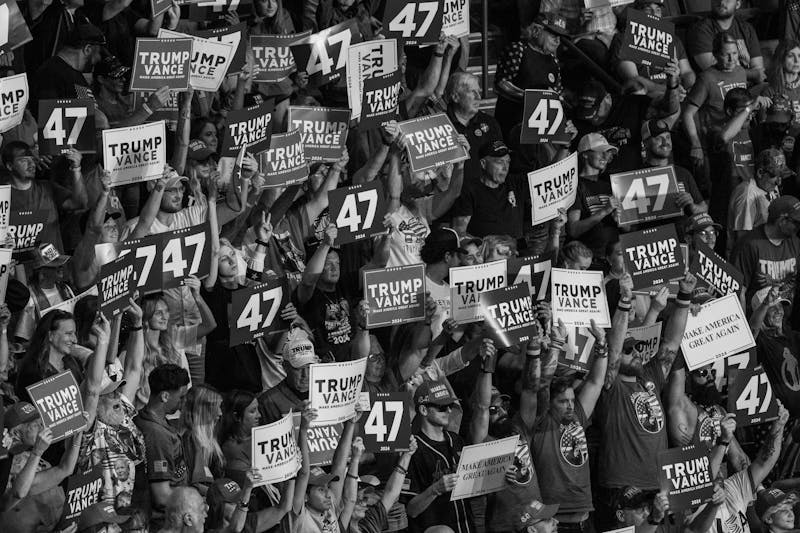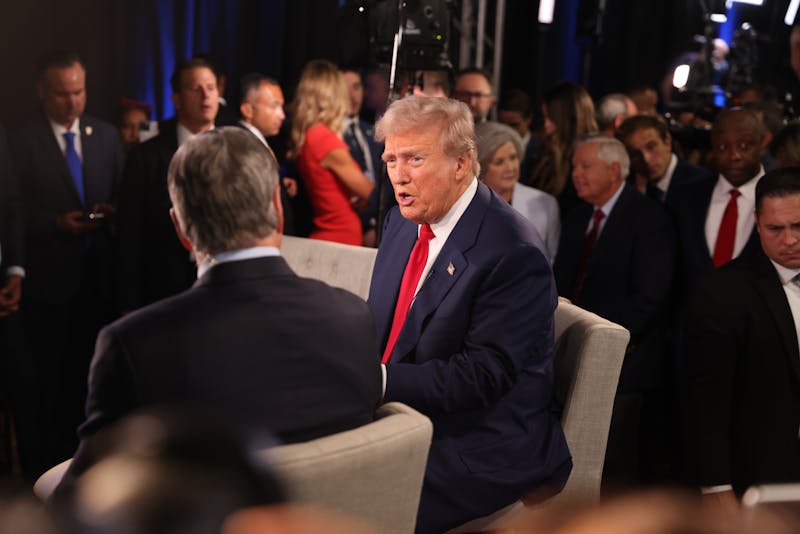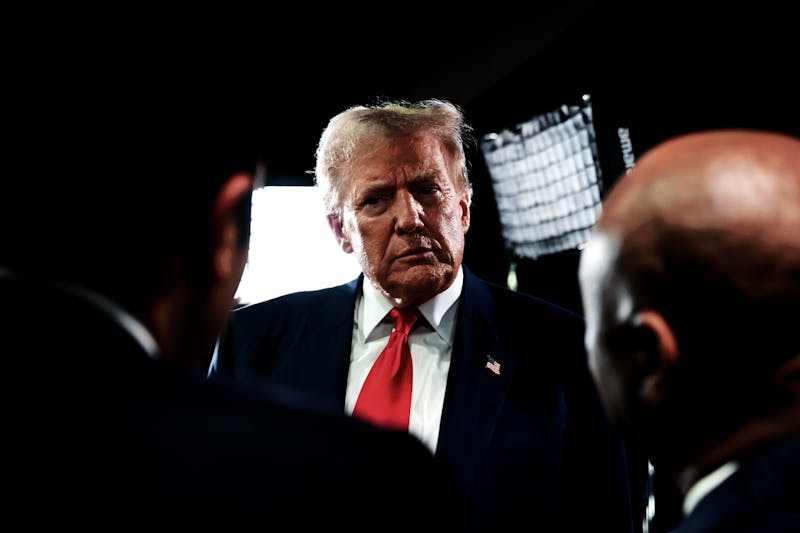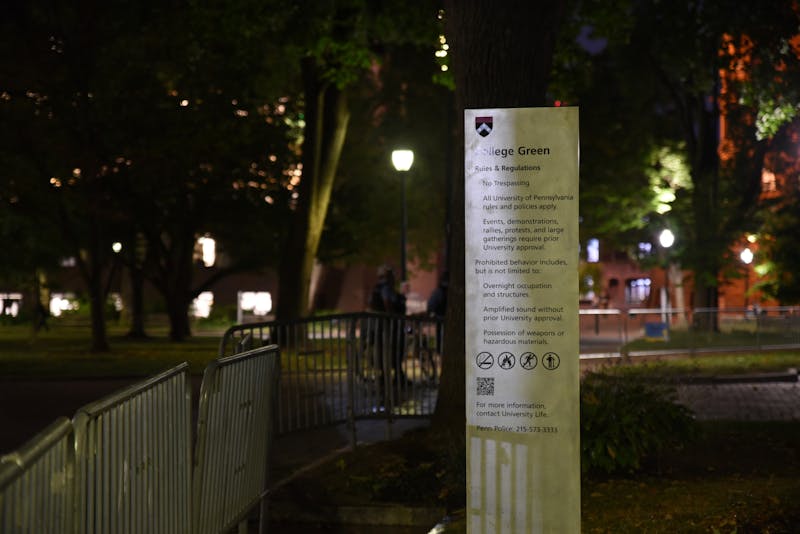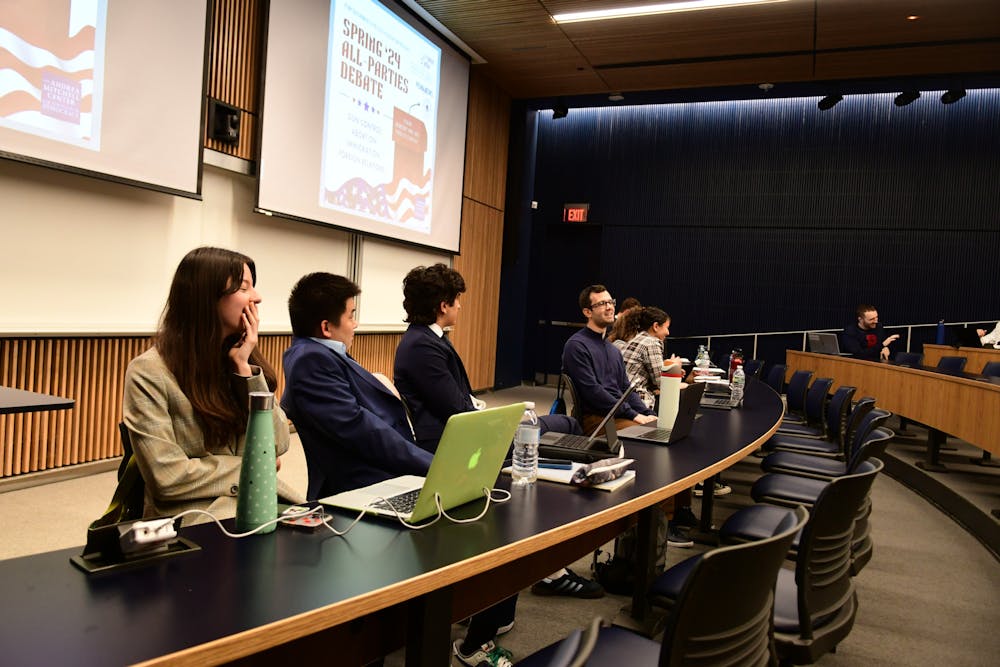
The Penn Government and Politics Association hosted a debate between student political parties on April 10, 2024.
Credit: Abhiram JuvvadiI remember waking up as a 10 year old on Nov. 9, 2016, crying in my mother’s arms about the colossal mistake just made by the American people. Nearly eight years later, I woke up to the news of another four years of 1968 Wharton graduate and former President Donald Trump's regime feeling like the same little girl, only this time in a college dorm instead of rock star bed sheets.
Growing up in rural West Virginia as a Democrat was a battle often fought and rarely won. West Virginia is a deep red state, with the Republican Party winning by an increasing margin each election. In the 2024 presidential election, Trump received 70% of the votes in the state. Not one county turned blue. Outside of my parents and a few friends, I grew up surrounded by a deeply conservative ideology which, among other things, taught me that my political views were to be hidden and only revealed in private.
Coming to Penn was my first chance to be in an environment that celebrated the ideals I’d been suppressing. Students and faculty at Ivy League schools are typically left leaning. Penn itself is known for its majority left-leaning student body with conservative students in the minority. While I am surrounded by significantly more left-leaning students at Penn than I was at home, that doesn’t mean political opinions are necessarily shared freely on campus.
In a video posted on Leading Britain’s Conversation, a British phone-in and talk radio station's TikTok page, a reporter can be seen interviewing young men on Penn’s campus on their pick for the 2024 presidential election. The men for Vice President Kamala Harris openly expressed their support and intention to cast their vote for her. But with more searching, he encountered students who were unsure about sharing their political party or ideology — which, the reporter noted, was a characteristic of students likely casting their vote for Trump.
Conservative students at Penn have expressed fear of openly declaring their political opinions in fear of rejection or ostracizing by students, faculty, and the University — raising questions as to the status of free speech on our campus. In class, I have been a part of numerous discussions about the unspoken limitations of speech within classrooms and on campus.
In a 2024 survey by the Foundation for Individual Rights and Expression, Penn was ranked fourth worst for free speech on college campuses. Penn’s place was determined “by surveying students on several components related to free speech, including ‘comfort expressing ideas,’ ‘disruptive conduct,’ and ‘administrative support.’ It also accounted for university responses to ‘speech controversies’ such as scheduled events, invited speakers, and the sanctioning of student groups.” Given Penn’s struggle with free speech, the election demonstrated the same cracks in our foundation.
Just as I was in West Virginia, Trump supporting students at Penn were minimized to their own self-fulfilling ecosystem where they relied entirely on their own beliefs instead of any outside sources in fear of retaliation. Without any input from dissenting opinions, this can reinforce an echo chamber of radicalization. All Penn students deserve to openly express their political ideologies. This does not mean, though, that they are exempt from the consequences of those beliefs.
In fact, I urge each student to embrace those consequences that come with expressing their political opinions. Fostering an environment where students can practice critical thinking and intellectual discussion is vital to break down the political polarization existent in America. Building a successful generation of American citizens means supplying our students with the skills to build a nuanced understanding of our political system. Perhaps the only way to gain this understanding is in conversation with the opposing side.
As voters in arguably the most important state in the 2024 presidential election, students at Penn should express the choices they made loudly and take accountability for them. For students on both sides of the political spectrum, be open to academic debate — if not to alter your views, to enrich your understanding and values. The only way we can move forward as a nation is to first declare our opinions openly. With a culture of accountability and participation in difficult conversations, we can move towards progress and potentially better results for the future of our country.
PIPER SLINKA-PETKA is a College first year studying health and societies from West Virginia. Her email address is pipersp@sas.upenn.edu.
The Daily Pennsylvanian is an independent, student-run newspaper. Please consider making a donation to support the coverage that shapes the University. Your generosity ensures a future of strong journalism at Penn.
Donate







